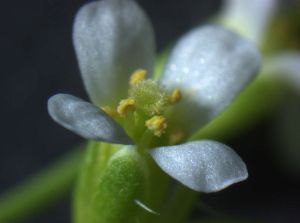Crop plants have always been adapted to the needs of man by breeding for them to carry more fruit, survive droughts, or resist pests. Green biotechnology now adds new tools to the classical breeding methods for a more rapid and efficient improvement of plant properties. A biotechnological technique developed by KIT botanists to more precisely and reliably install or modify genetic information in the plant genome is now presented by the expert journal PNAS. (DOI: 10.1073/pnas.1202191109).
The new method is based on the natural repair mechanism of plants. So-called homologous recombination repairs the genome when the genome strands in the cell break. “Using an appropriate enzyme, i.e. molecular scissors, we first make a cut at the right point in the genome and then supply the necessary patch to repair this cut,” says Friedrich Fauser from Karlsruhe Institute of Technology, who is the first author of the PNAS publication. “A part of this patch is the new gene piece we want to install. The rest is done by the repair service of the cell.”
Due to this trick, the method that is referred to as “in planta gene targeting” (IPGT) is highly reliable and the new genetic information is incorporated in the genome precisely at the point desired. In principle, IPGT may be applied to every plant. “This is a big advantage compared to conventional methods that work for certain plants only and produce a lot of rejects,” explains Professor Holger Puchta, who holds the Chair for Molecular Biology and Biochemistry of Plants at Karlsruhe Institute of Technology. “Thanks to appropriate molecular scissors and patches and the natural repair mechanism of the cell, IPGT is about 100 times more efficient than techniques used so far.”
With their experiments on the model plant of thale cress (Arabidopsis thaliana), the researchers of KIT, in cooperation with the company SunGene GmbH, a subsidiary of BASF Plant Science having its office at Gatersleben, have now succeeded in furnishing evidence of the fact that IPGT works in plants. “The next step towards broader application in biotechnolgoy will be the transfer of the principle to other plants and the development of appropriate scissors and patches,” says Puchta. In this way, the favorable properties of wild species can be transferred rapidly to crop plants. The long-term objective is the optimum use of natural resources for the production of food and vegetable raw materials.
The paper in the portal of the journal PNAS:
http://www.pnas.org/
The homepage of the working group of Professor Puchta.
http://www.botanik2.uni-karlsruhe.de/591.php
In close partnership with society, KIT develops solutions for urgent challenges – from climate change, energy transition and sustainable use of natural resources to artificial intelligence, sovereignty and an aging population. As The University in the Helmholtz Association, KIT unites scientific excellence from insight to application-driven research under one roof – and is thus in a unique position to drive this transformation. As a University of Excellence, KIT offers its more than 10,000 employees and 22,800 students outstanding opportunities to shape a sustainable and resilient future. KIT – Science for Impact.

